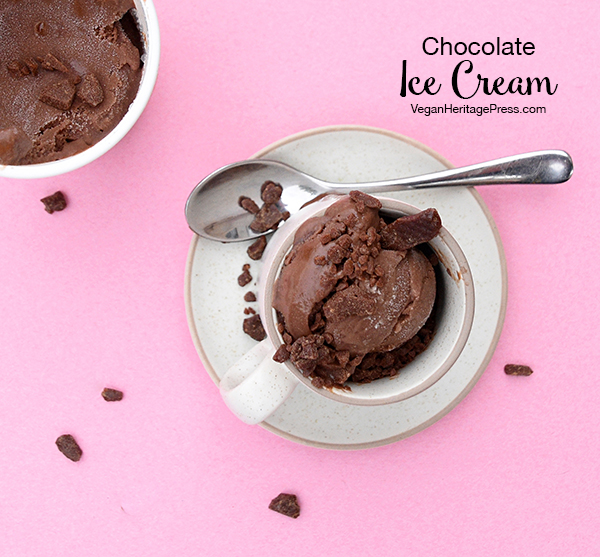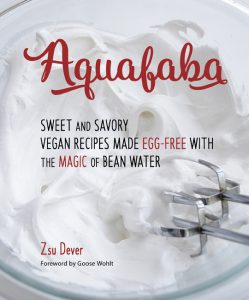 This vegan Chocolate Ice Cream from Aquafaba by Zsu Dever is a deliciously cool treat for a warm summer’s day.
This vegan Chocolate Ice Cream from Aquafaba by Zsu Dever is a deliciously cool treat for a warm summer’s day.
Although this ice cream hardens in the freezer, it will soften perfectly after a few minutes out of the freezer because of the addition of glucose syrup. If you’d like to omit the glucose syrup, add three more tablespoons sugar to the base.
Chocolate Ice Cream
Cream Base
- 1 tablespoon arrowroot or cornstarch
- 3 cups plain unsweetened soymilk, divided
- 1/2 cup lightly packed mashed firm tofu, rinsed before mashing
- 1 teaspoon psyllium husk powder
- 5 tablespoons nondairy butter, melted
- 1/2 cup unsweetened Dutch-process cocoa powder
- 1/2 cup plus 1 tablespoon granulated organic sugar
- 2 tablespoons glucose syrup or light corn syrup
- 1/4 teaspoon sea salt
- 1 teaspoon pure vanilla extract
Meringue
- 1/3 cup aquafaba (see Note)
- 1/4 teaspoon cream of tartar
- 1/4 cup granulated organic sugar
Preparation
- Cream Base: Combine the starch with 1/4 cup of the milk to form a slurry and set aside. Combine 1 cup of the milk, the tofu, and psyllium husk powder in a blender. Blend until very smooth. With the blender running, add the melted butter in a slow, steady stream to emulsify.
- Transfer the tofu mixture to a medium saucepan. Add the remaining 1 3/4 cups milk, cocoa, sugar, glucose syrup, and salt to the saucepan. Stir well with a whisk and bring to a boil over medium heat, making sure all the cocoa and sugar are dissolved. Add the starch slurry and reduce to a simmer, gently stirring until slightly thickened. Remove the cream base from the heat and stir in the vanilla. Transfer the cream base to a medium bowl and set aside to cool to room temperature.
- 3. Meringue: Add the aquafaba and cream of tartar to the bowl of a stand mixer. Using a whisk, whip the aquafaba for 10 seconds. Using a balloon whip attachment, whip the aquafaba on medium speed for 5 minutes. Increase the speed to medium-high and continue to whip for another 5 to 8 minutes, or until the aquafaba can hold stiff peaks and is climbing the side of the bowl. Add the sugar, 1 tablespoon at a time, over the course of 3 minutes and continue to whip until the sugar has dissolved, about 3 more minutes.
- Add a large scoop of the meringue to the cooled cream base and mix well. Add the rest of the meringue to the tempered cream base and fold to mix thoroughly. Chill in the refrigerator until completely cold, about 8 hours. It is normal if the cream base has separated somewhat overnight. Gently mix the chilled base and, using an ice cream machine, churn the cream as instructed by the manufacturer. Enjoy it as soft-serve immediately or transfer it to an airtight, freezer-safe container and freeze. Allow the ice cream to soften 10 to 20 minutes before serving if completely frozen.
Makes about 1 quart
Note: Although aquafaba is best if homemade using the recipe provided in the book, you can use aquafaba from canned chickpeas. Use the organic, low-sodium, canned chickpeas and strain off the liquid into a measuring cup using a fine mesh strainer. Note the amount of liquid you acquired, then add it to a medium saucepan and bring to a boil. Reduce to a simmer and cook until the liquid reduces by 1/3. Cool the aquafaba completely before using.
 Recipe from Aquafaba, copyright © 2016 by Zsu Dever. Used by permission.
Recipe from Aquafaba, copyright © 2016 by Zsu Dever. Used by permission.
Printable Chocolate Ice Cream recipe:
- 1 tablespoon arrowroot or cornstarch
- 3 cups plain unsweetened soymilk, divided
- ½ cup lightly packed mashed firm tofu, rinsed before mashing
- 1 teaspoon psyllium husk powder
- 5 tablespoons nondairy butter, melted
- ½ cup unsweetened Dutch-process cocoa powder
- ½ cup plus 1 tablespoon granulated organic sugar
- 2 tablespoons glucose syrup or light corn syrup
- ¼ teaspoon sea salt
- 1 teaspoon pure vanilla extract
- ⅓ cup aquafaba (see Note)
- ¼ teaspoon cream of tartar
- ¼ cup granulated organic sugar
- Cream Base: Combine the starch with ¼ cup of the milk to form a slurry and set aside. Combine 1 cup of the milk, the tofu, and psyllium husk powder in a blender. Blend until very smooth. With the blender running, add the melted butter in a slow, steady stream to emulsify.
- Transfer the tofu mixture to a medium saucepan. Add the remaining 1¾ cups milk, cocoa, sugar, glucose syrup, and salt to the saucepan. Stir well with a whisk and bring to a boil over medium heat, making sure all the cocoa and sugar are dissolved. Add the starch slurry and reduce to a simmer, gently stirring until slightly thickened. Remove the cream base from the heat and stir in the vanilla. Transfer the cream base to a medium bowl and set aside to cool to room temperature.
- Meringue: Add the aquafaba and cream of tartar to the bowl of a stand mixer. Using a whisk, whip the aquafaba for 10 seconds. Using a balloon whip attachment, whip the aquafaba on medium speed for 5 minutes. Increase the speed to medium-high and continue to whip for another 5 to 8 minutes, or until the aquafaba can hold stiff peaks and is climbing the side of the bowl. Add the sugar, 1 tablespoon at a time, over the course of 3 minutes and continue to whip until the sugar has dissolved, about 3 more minutes.
- Add a large scoop of the meringue to the cooled cream base and mix well. Add the rest of the meringue to the tempered cream base and fold to mix thoroughly. Chill in the refrigerator until completely cold, about 8 hours. It is normal if the cream base has separated somewhat overnight. Gently mix the chilled base and, using an ice cream machine, churn the cream as instructed by the manufacturer. Enjoy it as soft-serve immediately or transfer it to an airtight, freezer-safe container and freeze. Allow the ice cream to soften 10 to 20 minutes before serving if completely frozen.
From Aquafaba, copyright © 2016 by Zsu Dever. Used by permission.

